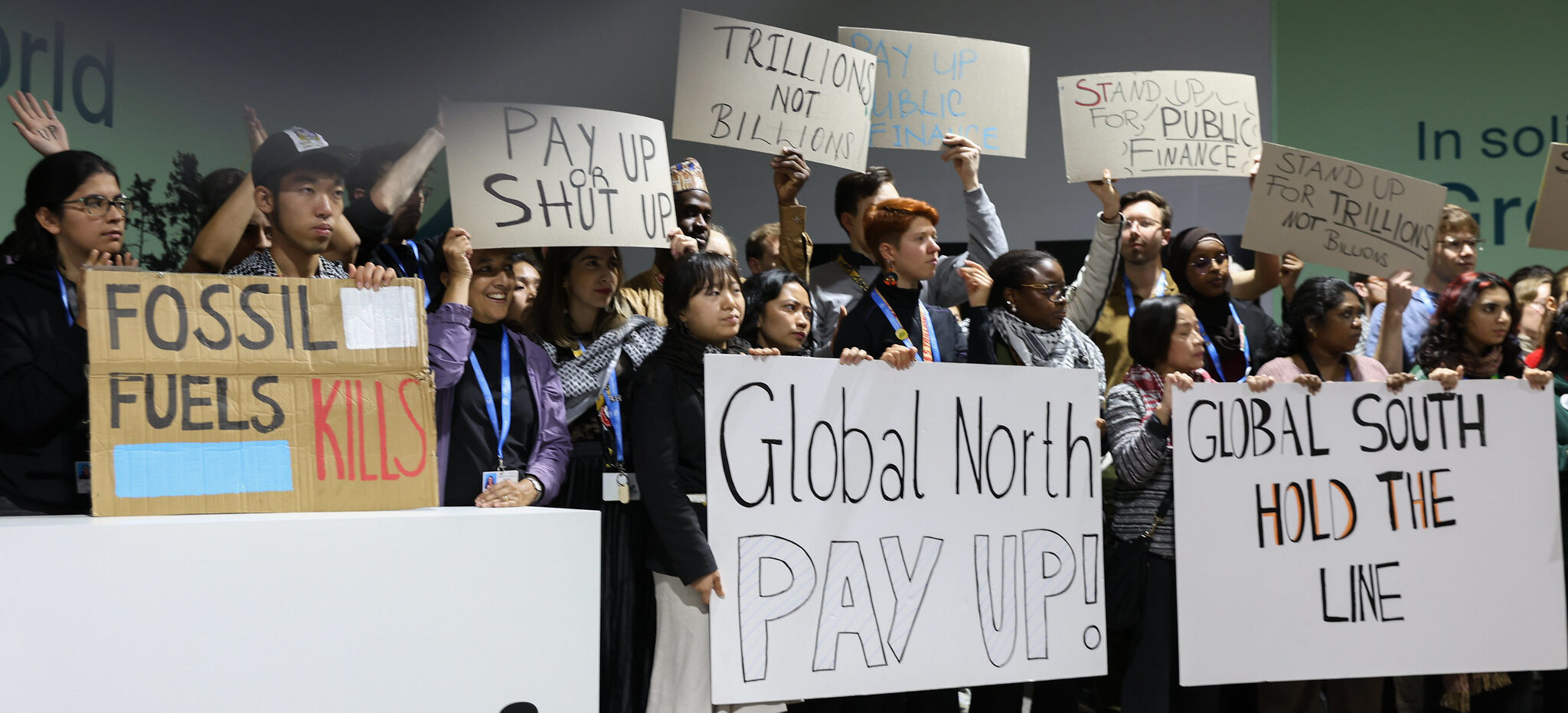COP29 disappoints a weak $300 Billion in funding
Sources to be "diverse," diluting the responsibility of wealthy nations; developing countries deem the decision an insult
OC – After much deadlock, tension, and being on the verge of collapse, COP29 approved the new climate financing target, the NCQG, in the early hours of Sunday morning (November 24, Azerbaijan time, Saturday evening in Brazil). The decision was met with strong opposition from developing countries, which described it as “an insult” and “a flagrant violation of climate justice.” The agreement allocates $300 billion annually by 2035 — far from the $1.3 trillion demanded — to fund climate action in developing nations.
Furthermore, the text avoids placing direct responsibility on developed countries (instead referring to them as being “at the forefront” of efforts), does not mandate that the financing be public (potentially diluting sources and accountability), and allows part of the funding to be delivered through loan mechanisms—a risk of debt accumulation for developing nations.
“The financing agreement closed today in Baku distorts the UNFCCC and undermines any concept of justice. With the help of an incompetent presidency, developed countries have once again managed to abandon their obligations and make developing countries foot the bill. Brazil now faces yet another monumental task for COP30: securing increased funding and rebuilding trust between nations,” said Claudio Angelo, International Policy Coordinator at Observatório do Clima. Stela Herschmann, an International Policy Specialist at the organization, emphasized that the outcome is a mockery of developing and vulnerable nations. “The new climate finance target adopted today is a step backward compared to the previous target. Not only is the amount insufficient but the responsibility of developed countries is diluted and unlikely to be reversed in the future”, she remarked.
Following the agreement’s approval — met with applause and frustration by others—the first response came in protest from Cuba’s representative. The delegate called the result inadequate and a demonstration of developed countries’ lack of commitment to their responsibilities: “A financing target that, directly or indirectly, seeks to turn developing nations into contributors to a fund that should be the responsibility of developed countries is a subversion of the Convention and the Paris Agreement. This increases resource flows from the Global South to the Global North, perpetuating environmental colonialism. (…) The $300 billion approved today is worth less, in real terms than the $100 billion of 2019 when adjusted for inflation,” he criticized.
The strongest reaction came from India’s representative, who declared outright rejection of the agreement. “We want to be heard, and we want our objections considered before approval. Developed countries are leading a $300 billion target for 2025. This does not address the issues faced by developing nations. The proposal we have does nothing. It is too low and will not enable climate action for survival. We cannot accept it. This document is nothing but a mirage. India opposes the adoption of this document,” she said, drawing loud applause from the plenary.
Mukhtar Babayev, president of COP29, stated that objections would be “noted in the final report,” indicating that opposition would not alter the decision.
The final agreement references the $1.3 trillion annual target, widely recognized as the necessary financing for developing countries. However, this figure is mentioned as a horizon, not a commitment, which drew sharp criticism from civil society. Additionally, the inclusion of loans as a financing mechanism was denounced.
Laurie van der Burg, Global Public Finance Campaign Manager at Oil Change International, linked the agreement’s shortcomings to fossil fuel industry interests: “The $300 billion climate finance offer in Baku is a sham—nowhere near what is needed, nor protected against debt traps. Wealthy nations are planning the failure of fossil fuel phase-out and dodging responsibility by forcing developing countries and the private sector to foot the bill. This creates a debt trap for those most vulnerable to the climate crisis,” she emphasized.
“If wealthy nations put their accumulated trillions on the table instead of offering excuses, we would see real progress in phasing out fossil fuels. The U.S., EU, and UK display repugnant indifference while millions pay with their lives. We will not give up,” van der Burg added.
To put things into perspective: dividing the current $300 billion by the number of least-developed countries, each of the 45 nations most vulnerable to the climate crisis would receive $6.6 billion annually. The estimated aid and recovery cost for Rio Grande do Sul after this year’s historic floods is up to BRL 100 billion (approximately $17 billion). In contrast, Brazil’s 2023 Family Farming Plan allocated over BRL 400 billion (nearly $69 billion) in credit to agribusiness.
Stalemate
Hours before the final plenary, Brazil’s Minister of Environment and Climate Change, Marina Silva, described the “painful experience” of the lack of agreement in Baku during a press conference. She reiterated that the proposal presented the previous day “is unacceptable” and hinted that discussions centered around the $300 billion annual amount.
“In Dubai, we established that we should align with 1.5°C [the Paris Agreement target to limit global warming] and that this required tripling renewable energy, doubling efficiency, and transitioning away from fossil fuels. Here, we must align the necessary resources to meet these efforts,” said Silva.
She also outlined the post-Baku priorities leading to next year’s conference in Belém: “Our central goal for COP30 will be aligning sufficiently ambitious NDCs to achieve the 1.5°C target. COP30 in Belém is a massive challenge that we can only achieve through the effort and collaboration of everyone represented here,” she stated.
Brazil’s responsibility was also highlighted by Marcio Astrini, Executive Secretary of Observatório do Clima, who hopes COP30 will bridge the gaps left by Baku: “The COP29 presidency was disastrous, surpassed only by the content of the approved text, which is utterly inadequate for addressing the climate crisis. Baku’s outcome reveals that wealthy countries are shirking responsibility while leaving the financing burden unresolved. COP30, under Brazil’s leadership, must be highly competent and dedicated to filling these gaps, advancing ambition, and keeping the 1.5°C goal alive,” he said. (LEILA SALIM AND PRISCILA PACHECO)







